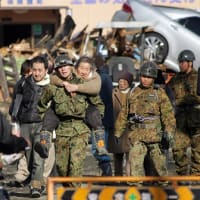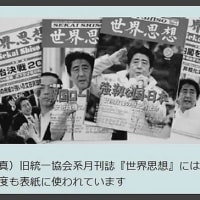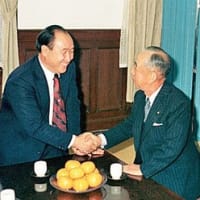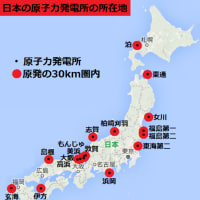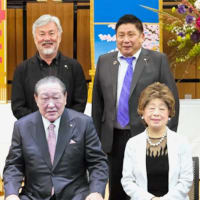Agreement Regarding the Activities and Presence of U.S. forces,
and its Withdrawal from Iraq
August, 6th, 2008 4:00pm
Foreword
Iraq and the U.S., referred to here as “both sides”, affirm the
importance of: supporting their joint security, participating in global
peace and stability, fighting terrorism, cooperation in the fields of
security and defense, and deterring threats against Iraq
’s sovereignty, security, and territorial integrity.
Both sides affirm that this cooperation is based on mutual respect of both
sides
’ sovereignty in accordance with the United Nations’ goals and
principles.
Both sides want to achieve mutual understanding to support their
collaboration, without jeopardizing Iraq
’s sovereignty over its land, water, and sky, and based on the mutual
guarantees given as equal and independent sovereign partners.
Both sides have agreed on:
Article One
Scope and goal
This agreement specifies the rules and basic needs that regulate the
temporary presence and activities of the U.S. troops and its withdrawal
from Iraq.
Article Two
Definitions
1- “Installations and areas agreed upon” are the installations and areas
agreed upon owned by the Iraqi government and used by the U.S. forces from
the date this agreement goes into effect. Such installations and areas
agreed upon will be decided in a list provided by the U.S. forces and
reviewed by both sides. Such
“installations and areas agreed upon” include those provided to the U.S.
forces during the time of this agreement after the approval of both sides.
Iraqi suggestion: The Iraqi delegation has asked the U.S. delegation to
submit a list of structures and areas requested to be discussed and agreed
upon and add it to the agreement as an appendix.
2- “U.S. forces” is the entity that includes the members of the armed
forces, civilian members, and all the equipments and materials owned by the
U.S. forces in Iraq.
3- “Members of the armed forces” include any member of the U.S. army,
navy, air force, marines or coast guard.
4- “Civilian members” include any civilian working for the U.S. Ministry
of Defense, excluding those members who usually reside in Iraq.
5- “U.S. contractors” or “workers hired by U.S. contractors” include
non Iraqi persons and entities and employees who are U.S. or third country
citizens and who are in Iraq to supply goods, services or security to the
U.S. forces or on behalf of it in accordance to a contract. This does not
include Iraqi entities.
6- “Official vehicles”: commercial vehicles that may be modified for
security reasons, and are designed originally to transport individuals on
different terrains.
7- “Military vehicles”: include all vehicles used by the U.S. armed
forces, that were originally designed for combat operations, and have
special numbers and signs in accordance to the regulations and laws of U.S.
armed forces.
8- “defense equipment” include systems, weapons, ammunition, equipment,
and materials used in conventional wars only, that the U.S. forces need in
accordance to this agreement, and that are not connected in any way to
weapons of mass destruction (chemical weapons, nuclear weapons,
radiological weapons, biological weapons, and waste related to such
weapons).
9- “storage”: keeping defense equipment needed by the U.S. forces for
activities agreed upon in this agreement.
10- “taxes and custom”: include all taxes, customs (including border
customs), and any other tariffs enforced by the Iraqi government and its
entities and provinces in accordance to Iraqi laws and regulations. This
does not include money paid for the Iraqi government in exchange for
services required or used by the U.S. forces.
Article Three
Rule of Law
All members of the U.S. armed forces and civilian members must follow Iraqi
laws, customs, traditions, and agreements while conducting military
operations in accordance to this agreement. They must also avoid any
activities that do not agree with the text and spirit of this agreement. It
is the responsibility of the U.S. to take all necessary measures to insure
this.
Article Four
Responsibilities
For the purpose of deterring external and/or internal threats against the
Republic of Iraq, and to continue the collaboration to defeat Al-Qaeda in
Iraq and other outlaw groups, temporarily, both sides have agreed on:
1- The Iraqi government asks for the temporary help of the U.S. forces to
support Iraq
’s effort in maintaining security and stability of Iraq, including the
collaboration in conducting operations against Al-Qaeda and other terrorist
groups and outlaw groups, including the remains of the former regime.
- Military operations that are conducted in accordance to this agreement
with the approval of the Iraqi government and with full coordination with
Iraqi authorities. Coordinating such military operations will be supervised
by a joint mobile operations command centers (JMOCC) created in accordance
with this agreement. Any military issues that are not resolved by these
centers are submitted to a joint committee of ministries.
3- Operations must respect the Iraqi constitution and laws, and Iraqi
sovereignty and national interests as defined by the Iraqi government. The
U.S. forces must respect the Iraqi laws, traditions, and customs.
4- Both sides will continue their efforts in collaboration and improving
Iraq
’s security capacity, including training, supplying, supporting, founding,
and upgrading administrative systems.
5- There is nothing in this agreement that limits either sides’ rights of
self defense.
Article Five
Property Ownership
1- Iraq owns all non-mobile buildings and structures that are built on the
ground in the installations and areas agreed upon, including those built,
used, enhanced, or changed by the U.S. forces.
2- The U.S. is responsible for all expenses of construction, remodeling,
modification in installations and areas agreed upon used exclusively by the
U.S.. The U.S. forces will consult with the Iraqi authorities regarding the
works of construction, remodeling, and modification. The U.S. will seek the
Iraqi government
’s approval for major construction or modification projects. In case of
shared use of installations and areas agreed upon both sides are
responsible for expenses. The U.S. forces will pay the fees of services
used exclusively by the U.S.Both sides cover the expenses of shared
installations and areas agreed upon.
3- In the case of a discovery of historic or cultural sites, or the
discovery of a strategic natural resource, in the installations and areas
agreed upon, all work of construction or modification or remodeling must
stop immediately, and the Iraqi representatives in the joint committee must
be informed.
4- The United States will return all installations and areas agreed upon
and any non-mobile buildings that were constructed, remodeled, or modified
under this agreement, according to mechanisms and priorities agreed upon by
the joint committee. They will be returned to Iraq without charge, unless
both sides agree otherwise.
5- The U.S. will return all installations and areas agreed upon that have
special cultural or political importance and that were constructed,
remodeled, or modified under this agreement, according to mechanisms and
priorities agreed upon by the joint committee. When this agreement goes
into effect, the U.S. will immediately return the properties listed in the
attached appendix and mentioned in the letter sent by the U.S. embassy to
the Iraqi minister of foreign affairs dated (
…)
6- What remains of installations and areas agreed upon will be returned to
the Iraqi authorities after this agreement expires or if the U.S. forces no
longer needs them.
7- The U.S. forces and U.S. contractors maintain their ownership of all
equipment, materials, supplements, mobile structures, and other mobile
properties imported to Iraq or obtained in Iraq in accordance to the
agreement.
Article Six
Usage of Installations and areas agreed upon
1- Iraq guarantees the accessibility of the U.S. forces and U.S.
contractors to installations and areas agreed upon according to what both
sides agree on, while insuring that Iraq
’s sovereignty is not undermined. Installations and areas agreed upon will
be returned to Iraq without charge, unless both sides agree otherwise.
2- Iraq authorizes the U.S. forces to practice all the authorities and have
all the rights to manage construct, use, maintain, and secure installations
and areas agreed upon. Both sides coordinate and collaborate regarding
shared installations and areas agreed upon.
3- The United States forces control the entrances of the installations and
areas agreed upon. Both sides coordinate their work in shared installations
and areas agreed upon based on mechanisms put by the joint military
operations committee.
and its Withdrawal from Iraq
August, 6th, 2008 4:00pm
Foreword
Iraq and the U.S., referred to here as “both sides”, affirm the
importance of: supporting their joint security, participating in global
peace and stability, fighting terrorism, cooperation in the fields of
security and defense, and deterring threats against Iraq
’s sovereignty, security, and territorial integrity.
Both sides affirm that this cooperation is based on mutual respect of both
sides
’ sovereignty in accordance with the United Nations’ goals and
principles.
Both sides want to achieve mutual understanding to support their
collaboration, without jeopardizing Iraq
’s sovereignty over its land, water, and sky, and based on the mutual
guarantees given as equal and independent sovereign partners.
Both sides have agreed on:
Article One
Scope and goal
This agreement specifies the rules and basic needs that regulate the
temporary presence and activities of the U.S. troops and its withdrawal
from Iraq.
Article Two
Definitions
1- “Installations and areas agreed upon” are the installations and areas
agreed upon owned by the Iraqi government and used by the U.S. forces from
the date this agreement goes into effect. Such installations and areas
agreed upon will be decided in a list provided by the U.S. forces and
reviewed by both sides. Such
“installations and areas agreed upon” include those provided to the U.S.
forces during the time of this agreement after the approval of both sides.
Iraqi suggestion: The Iraqi delegation has asked the U.S. delegation to
submit a list of structures and areas requested to be discussed and agreed
upon and add it to the agreement as an appendix.
2- “U.S. forces” is the entity that includes the members of the armed
forces, civilian members, and all the equipments and materials owned by the
U.S. forces in Iraq.
3- “Members of the armed forces” include any member of the U.S. army,
navy, air force, marines or coast guard.
4- “Civilian members” include any civilian working for the U.S. Ministry
of Defense, excluding those members who usually reside in Iraq.
5- “U.S. contractors” or “workers hired by U.S. contractors” include
non Iraqi persons and entities and employees who are U.S. or third country
citizens and who are in Iraq to supply goods, services or security to the
U.S. forces or on behalf of it in accordance to a contract. This does not
include Iraqi entities.
6- “Official vehicles”: commercial vehicles that may be modified for
security reasons, and are designed originally to transport individuals on
different terrains.
7- “Military vehicles”: include all vehicles used by the U.S. armed
forces, that were originally designed for combat operations, and have
special numbers and signs in accordance to the regulations and laws of U.S.
armed forces.
8- “defense equipment” include systems, weapons, ammunition, equipment,
and materials used in conventional wars only, that the U.S. forces need in
accordance to this agreement, and that are not connected in any way to
weapons of mass destruction (chemical weapons, nuclear weapons,
radiological weapons, biological weapons, and waste related to such
weapons).
9- “storage”: keeping defense equipment needed by the U.S. forces for
activities agreed upon in this agreement.
10- “taxes and custom”: include all taxes, customs (including border
customs), and any other tariffs enforced by the Iraqi government and its
entities and provinces in accordance to Iraqi laws and regulations. This
does not include money paid for the Iraqi government in exchange for
services required or used by the U.S. forces.
Article Three
Rule of Law
All members of the U.S. armed forces and civilian members must follow Iraqi
laws, customs, traditions, and agreements while conducting military
operations in accordance to this agreement. They must also avoid any
activities that do not agree with the text and spirit of this agreement. It
is the responsibility of the U.S. to take all necessary measures to insure
this.
Article Four
Responsibilities
For the purpose of deterring external and/or internal threats against the
Republic of Iraq, and to continue the collaboration to defeat Al-Qaeda in
Iraq and other outlaw groups, temporarily, both sides have agreed on:
1- The Iraqi government asks for the temporary help of the U.S. forces to
support Iraq
’s effort in maintaining security and stability of Iraq, including the
collaboration in conducting operations against Al-Qaeda and other terrorist
groups and outlaw groups, including the remains of the former regime.
- Military operations that are conducted in accordance to this agreement
with the approval of the Iraqi government and with full coordination with
Iraqi authorities. Coordinating such military operations will be supervised
by a joint mobile operations command centers (JMOCC) created in accordance
with this agreement. Any military issues that are not resolved by these
centers are submitted to a joint committee of ministries.
3- Operations must respect the Iraqi constitution and laws, and Iraqi
sovereignty and national interests as defined by the Iraqi government. The
U.S. forces must respect the Iraqi laws, traditions, and customs.
4- Both sides will continue their efforts in collaboration and improving
Iraq
’s security capacity, including training, supplying, supporting, founding,
and upgrading administrative systems.
5- There is nothing in this agreement that limits either sides’ rights of
self defense.
Article Five
Property Ownership
1- Iraq owns all non-mobile buildings and structures that are built on the
ground in the installations and areas agreed upon, including those built,
used, enhanced, or changed by the U.S. forces.
2- The U.S. is responsible for all expenses of construction, remodeling,
modification in installations and areas agreed upon used exclusively by the
U.S.. The U.S. forces will consult with the Iraqi authorities regarding the
works of construction, remodeling, and modification. The U.S. will seek the
Iraqi government
’s approval for major construction or modification projects. In case of
shared use of installations and areas agreed upon both sides are
responsible for expenses. The U.S. forces will pay the fees of services
used exclusively by the U.S.Both sides cover the expenses of shared
installations and areas agreed upon.
3- In the case of a discovery of historic or cultural sites, or the
discovery of a strategic natural resource, in the installations and areas
agreed upon, all work of construction or modification or remodeling must
stop immediately, and the Iraqi representatives in the joint committee must
be informed.
4- The United States will return all installations and areas agreed upon
and any non-mobile buildings that were constructed, remodeled, or modified
under this agreement, according to mechanisms and priorities agreed upon by
the joint committee. They will be returned to Iraq without charge, unless
both sides agree otherwise.
5- The U.S. will return all installations and areas agreed upon that have
special cultural or political importance and that were constructed,
remodeled, or modified under this agreement, according to mechanisms and
priorities agreed upon by the joint committee. When this agreement goes
into effect, the U.S. will immediately return the properties listed in the
attached appendix and mentioned in the letter sent by the U.S. embassy to
the Iraqi minister of foreign affairs dated (
…)
6- What remains of installations and areas agreed upon will be returned to
the Iraqi authorities after this agreement expires or if the U.S. forces no
longer needs them.
7- The U.S. forces and U.S. contractors maintain their ownership of all
equipment, materials, supplements, mobile structures, and other mobile
properties imported to Iraq or obtained in Iraq in accordance to the
agreement.
Article Six
Usage of Installations and areas agreed upon
1- Iraq guarantees the accessibility of the U.S. forces and U.S.
contractors to installations and areas agreed upon according to what both
sides agree on, while insuring that Iraq
’s sovereignty is not undermined. Installations and areas agreed upon will
be returned to Iraq without charge, unless both sides agree otherwise.
2- Iraq authorizes the U.S. forces to practice all the authorities and have
all the rights to manage construct, use, maintain, and secure installations
and areas agreed upon. Both sides coordinate and collaborate regarding
shared installations and areas agreed upon.
3- The United States forces control the entrances of the installations and
areas agreed upon. Both sides coordinate their work in shared installations
and areas agreed upon based on mechanisms put by the joint military
operations committee.










